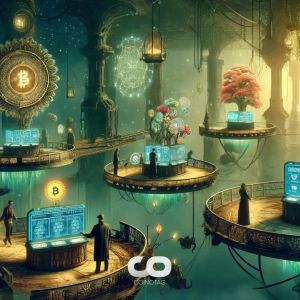According to a report by Gartner , the blockchain is expected to grow by a little over $176 billion by 2025 and then create an astounding $3.1 trillion in new business value by 2030. Blockchain technology is transforming many industries and gaming is one of them. I’ve been in the blockchain industry for well over ten years. In this time, my personal opinion is that aside from real-world assets, there aren’t any other sectors that blockchain technology has had a huge effect on like the gaming sector. The technology’s versatility has been in full flow, finding usefulness in exciting gaming niches. Some of these areas include the ability for players to earn assets and own digital items. These items can also be changed into real-world money. Interoperability is another versatility that blockchain technology has brought to gaming. Here’s how. Because of blockchain, players can now truly own and monetize their assets through Non-Fungible Tokens (NFTs), and these tokens aren’t limited to the game’s ecosystem. This has opened up opportunities for trading—including lending and borrowing—gaming assets in a vibrant virtual environment. In this article, we’ll discuss this gaming revolution, as well as mention a couple of blockchain-based projects pioneering the provision of gaming and financial opportunities to players. The eSports Blockchain Revolution A popular form of entertainment over the years is served by the eSports sector. According to reports , the eSports gaming market revenue is predicted to reach $4.3 billion in 2024. This demonstrates a Compound Annual Growth Rate (CAGR) of 6.59%, resulting in a market volume of $5.9 billion by 2029. eSports has moved from small tournaments to having top teams compete for multi-million dollar prizes. It is also now attracting millions of viewers. In 2020, eSports had a global audience of around 436 million viewers. That number grew to 532 in 2022 and is projected to surpass 640.8 million by 2025. I know these are impressive numbers, but the eSports scene still faces some issues. Issues like transparency, ownership, and profit distribution. Players are investing their time and other resources into honing their skills, while a major part of the profits goes to the organizers and developers of the tournaments. QORPO is a platform in the eSports niche that uses the blockchain to provide a solution to in-game ownership and profit sharing, ensuring transparency. QORPO is a company that’s doing something very vital. It is positioning itself at the junction where blockchain technology and eSports meet. The company is on a mission to provide access to high-level competitions to a wider audience. QORPO has a flagship project, Citizen Conflict, a hero shooter game that combines fast-paced gameplay with the robust infrastructure of eSports. Reimagination of Virtual Worlds MMORPG is one of the most complex genres in video games. They provide players with the chance to explore fantastical virtual worlds with other players of varying backgrounds. They are essentially role-playing games but on a massive scale. Some of the features that can be found in these games include elements of role-playing, fiction, interaction, and online chat forums. Players can embark on quests, interact with other players, and fight monsters. According to a report by Verified Market Research , the MMORPG market size was valued at $31.26 billion in 2023 and is projected to reach $59.55 billion by 2030. This is at a CAGR of 8.28% from 2024 to 2030. World of Warcraft’s release in 2004 was a defining moment in the MMORPG genre. WoW gained widespread popularity due to its accessibility, captivating storytelling, and depth. This was the north star that game developers needed, and today there are thousands of MMORPG games all over the world. One such gaming platform is Sidus Heroes. Sidus Heroes is a futuristic NFT-powered MMORPG. The game boasts a holistic player-driven gaming economy where players can own in-game content, opening the doors for trading in-game. Recent data show that in August 2024, blockchain games saw growth with a 5% increase in daily unique active wallets (dUAW), with a record of 4.2 million active wallets. Sidus Heroes is one such game that’s experiencing growth in this sector. The game transports players to a world where technological advancements are at a level where humans merge and become one with them. The gameplay has 12 tech-centric races representing different blockchains and inhabiting the universe. That is a universe of races like Bitcoine, Etheredus, Polkacyon, etc. Broader Implications of Blockchain in Gaming Blockchain technology in the gaming industry is rapidly transforming the virtual entertainment ecosystem. More than its technological freshness, this integration is proof of a fundamental shift in the interaction of players with virtual worlds. Blockchain technology is systematically dismantling traditional barriers, and creating worlds where players have never-before-seen economic agency and ownership of in-game assets. The blockchain industry is still a relatively young one and as it continues to mature, it promises more sophistication and immersion in the games and gaming experience blockchain games launch. The next generation of games will feature better game economies, provide transparent reward mechanisms, and improve interoperability across games and platforms. As the industry continues to innovate and adapt to blockchain technology, more games will flood the market, blurring the lines between playing, working, and investing. This will create new avenues for value creation and digital entertainment. Conclusion The adaptation of blockchain technology in gaming is more than a technological trend—it’s a fundamental reimagination of play, value creation, and virtual interaction. QORPO and Sidus Heroes are examples of projects that are not only developing games but also pioneering ecosystems where players have become active participants and owners. As blockchain continues to evolve, it’ll transform gaming from what is typically a passive entertainment experience into an interactive ecosystem filled with opportunities for play and economic empowerment. Gaming economies have the potential to grow beyond their current use cases. The introduction of smart contracts and tokenization to gaming, has made it possible for players to earn, trade, and invest in virtual assets they can get real-world value from. This is disrupting conventional modes of gaming monetization. Ultimately, it is taking the economic power away from game publishers and putting it directly in the hands of players. The post Blockchain’s Game-changing Impact appeared first on CoinGape .





















